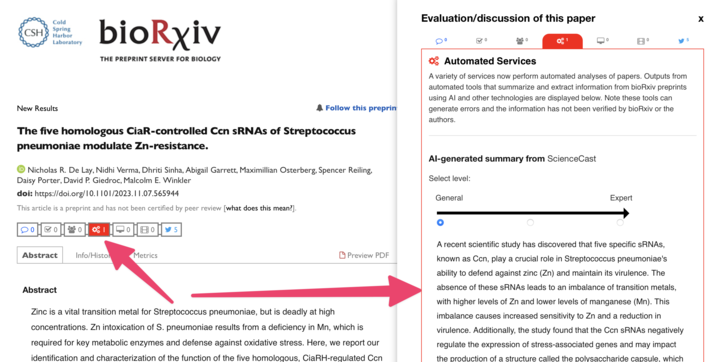News & Notes > Broadening audience, increasing understanding
Broadening audience, increasing understanding
bioRxiv | 2023-11-08
A new pilot makes bioRxiv preprints accessible to a wider range of readers
Many biomedical research papers are readily understood only by those who know as much about the topic as their authors do. There are understandable reasons for this. Science is increasingly specialized, which means that aficionados of specific fields develop terminologies, nomenclatures, and even technologies that can make the work feel impenetrable. So even working scientists reading outside their own area of expertise can struggle to understand what was actually done and why it is important.
As a preprint server that costs nothing to read, bioRxiv has a massive, worldwide audience that views and downloads millions of articles each month. We don't track readers or ask them to register but we have anecdotal evidence for who they are. Enormous numbers of professional scientists, clearly, but many other kinds of readers too, including undergraduate and medical students, teachers at every level, journalists, patients and their advocates, and members of the public who are intellectually curious about our world and biology. These more general readers must also grapple with articles not written with them in mind.
Large language models (LLMs) have garnered much attention since the release of chatGPT earlier this year, and LLMs and other forms of AI have numerous potential applications in scholarly communication. Today we are launching a new pilot project aimed at using LLMs to increase accessibility of content on bioRxiv. Every bioRxiv preprint will now be posted with three AI-generated summaries, each created for a different kind of reader: someone with little or no scientific training; a scientist with expertise in a different field; and someone whose expertise equals the author's. The summaries are created from the full text of the preprint, not just the abstract. They can be found under the Automated Services tab on the dashboard, which can be launched by the widget under the list of authors.

The AI underpinning this new feature was developed by our partner Sciencecast, a participant in the arXiv Labs initiative. And on Sciencecast's digital platform, audio versions of the bioRxiv preprint summaries will be available for anyone who prefers listening to reading. This is just the first step. bioRxiv and Sciencecast also plan to roll out new applications of these tools in the coming months.
We are excited about increasing the accessibility of the preprints on bioRxiv and broadening understanding of the meaning of new scientific work. Our hope is that the preprint summaries will help the public be better informed, students and teachers to better connect, journalists to cover biomedicine with greater depth and accuracy, and working scientists to be more adept as cross-disciplinary collaborators. We welcome readers' reactions to this new feature via email at biorxiv@cshl.edu and bioRxiv's social media accounts on X, Bluesky, Mastodon, LinkedIn, Instagram, and Facebook.
Update 1/24/24
The bioRxiv AI pilot to improve accessibility has been extended. The AI prompts have been adjusted to improve the summaries generated, and authors are now given the opportunity to edit these. Where a summary has been edited by the author, this is indicated below the summary. Authors who do not wish to have an AI-generated summary can also delete the summary entirely if they wish. A further change is to provide two summaries (general and expert) rather than three, as it became clear the intermediate-level summary was not sufficiently distinct.
